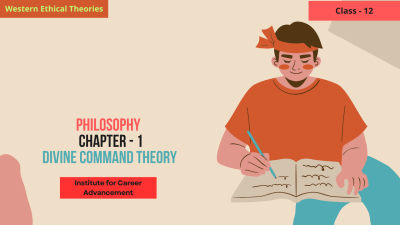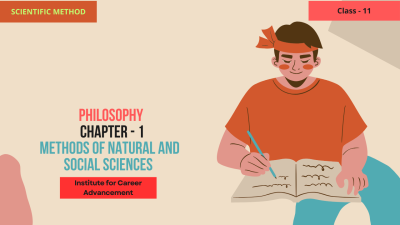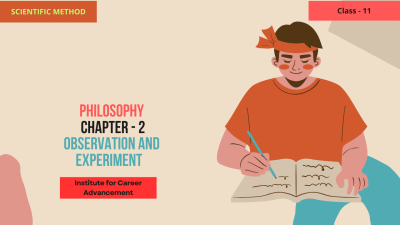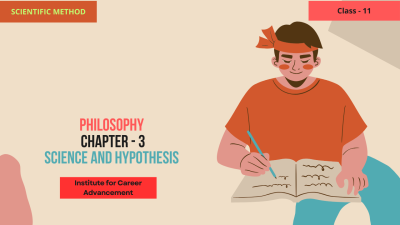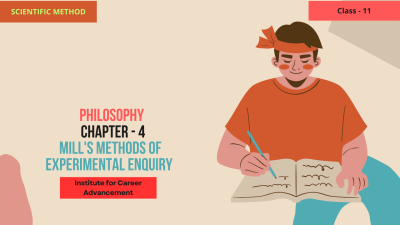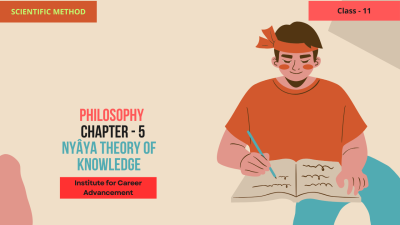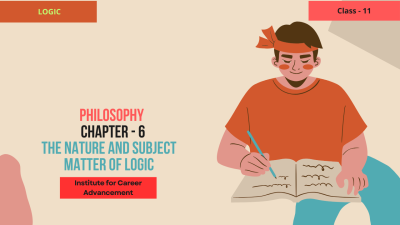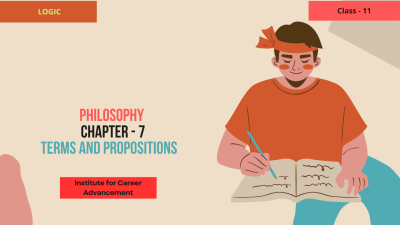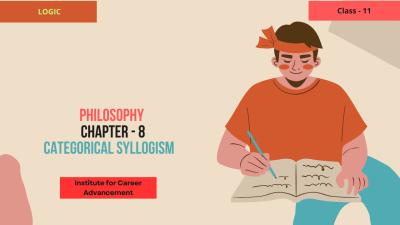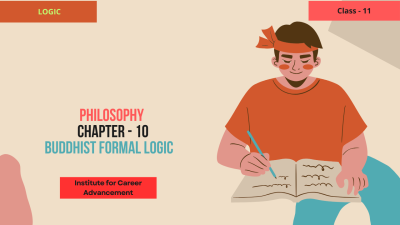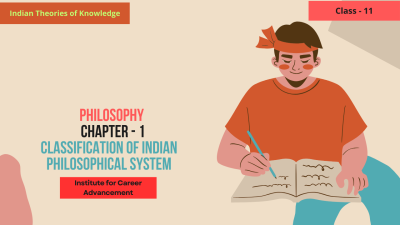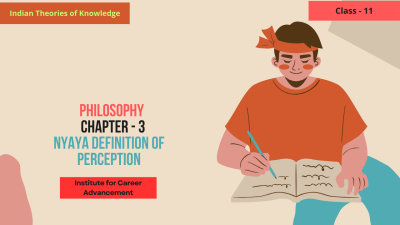Course description
Divine Command Theory is a significant topic discussed in Class 12 philosophy as part of the study of ethics and moral philosophy. This theory suggests that morality is ultimately grounded in the will or commands of a divine being, typically God. The theory plays an essential role in understanding how religious beliefs intersect with ethical decision-making.
Course Overview:
1. Introduction to Divine Command Theory:
Objective: To understand the basic tenets of Divine Command Theory and its foundational role in moral philosophy.
Key Concepts:
Definition of Divine Command Theory: The theory that ethical principles and moral laws are directly commanded by a divine being (e.g., God) and that moral standards depend on God's will.
The connection between ethics and religion in shaping moral behavior.
Key proponents and thinkers associated with this theory.
2. Historical Context and Development:
Objective: To explore the historical background of Divine Command Theory, including how it has evolved through various religious traditions.
Key Concepts:
Development of the theory in Judeo-Christian traditions.
Influence of Greek philosophy, such as the works of Plato and Aristotle, in shaping early ideas about divine will.
The transition from medieval Christian thought to modern understandings of morality.
Influence of philosophers like William of Ockham, Immanuel Kant, and others who discussed the divine basis of morality.
3. Key Components of Divine Command Theory:
Objective: To examine the primary components of the theory and understand how it relates to ethics.
Key Concepts:
Moral Absolutism: The idea that ethical rules are fixed, unchanging, and depend on God's will.
Moral Authority of God: How God’s will serves as the ultimate source of moral truth and ethical behavior.
Objective Morality: The belief that moral facts exist independently of human opinion, and they are revealed through divine commands.
4. The Euthyphro Dilemma:
Objective: To discuss one of the most famous challenges to Divine Command Theory, posed by Plato in the Euthyphro dialogue.
Key Concepts:
The Euthyphro Dilemma: The question of whether something is morally good because God commands it, or whether God commands it because it is morally good.
Exploration of the implications of this dilemma for Divine Command Theory.
Philosophical responses to the dilemma, including theistic perspectives and non-theistic critiques.
5. Strengths of Divine Command Theory:
Objective: To explore the advantages and supportive arguments for Divine Command Theory.
Key Concepts:
Provides a clear and objective source for moral authority.
Offers a unified system of morality based on divine will.
Moral rules and commands are not arbitrary; they are based on divine perfection and goodness.
Establishes a foundation for universal moral duties, given that God is considered omnipotent and omnibenevolent.
6. Criticisms and Challenges:
Objective: To critically examine the main criticisms of Divine Command Theory and understand alternative ethical theories.
Key Concepts:
The Euthyphro Dilemma and its challenge to the idea that God’s commands are the basis of morality.
Moral Autonomy: The argument that morality should not be based on external divine commands but should stem from human reason and autonomy.
Divine Hiddenness: The challenge that the existence and will of God are not always clear, making it difficult to base moral law on divine commands.
Pluralism: The challenge posed by the existence of multiple religions with different conceptions of God's will, which can lead to conflicting moral directives.
7. Divine Command Theory vs. Secular Ethics:
Objective: To compare Divine Command Theory with other ethical theories, such as Utilitarianism, Kantian Ethics, and Virtue Ethics.
Key Concepts:
Secular Ethics: Theories of ethics that do not rely on a divine or supernatural being (e.g., human-centered approaches like consequentialism or deontological ethics).
Comparison of the strengths and limitations of Divine Command Theory versus secular ethical systems in addressing moral dilemmas.
Exploration of how reason and intuition factor into moral decision-making in secular ethics.
8. Contemporary Relevance of Divine Command Theory:
Objective: To discuss the ongoing relevance and influence of Divine Command Theory in the modern world.
Key Concepts:
The role of religious beliefs in shaping moral standards in contemporary societies.
Application of Divine Command Theory in social issues, such as abortion, euthanasia, and same-sex marriage.
The continuing debate between religious and secular ethics in public policy and law.
9. Reflection on Morality and Religion:
Objective: To encourage students to reflect on the relationship between religion, morality, and personal belief systems.
নৈতিকতা এবং নৈতিক দর্শনের অধ্যয়নের অংশ হিসাবে দ্বাদশ শ্রেণির দর্শনে ঐশ্বরিক আদেশ তত্ত্ব একটি গুরুত্বপূর্ণ বিষয়। এই তত্ত্ব থেকে বোঝা যায় যে নৈতিকতা শেষ পর্যন্ত একটি ঐশ্বরিক সত্তা, সাধারণত ঈশ্বরের ইচ্ছা বা আদেশের উপর ভিত্তি করে। ধর্মীয় বিশ্বাস কীভাবে নৈতিক সিদ্ধান্ত গ্রহণের সাথে ছেদ করে তা বোঝার জন্য এই তত্ত্বটি একটি গুরুত্বপূর্ণ ভূমিকা পালন করে।
কোর্স ওভারভিউঃ
1টি। ঐশিক আদেশ তত্ত্বের পরিচিতিঃ
উদ্দেশ্যঃ ঐশ্বরিক আদেশ তত্ত্বের মৌলিক নীতিগুলি এবং নৈতিক দর্শনে এর মৌলিক ভূমিকা বোঝা।
মূল ধারণাগুলিঃ
ঐশ্বরিক আদেশ তত্ত্বের সংজ্ঞাঃ তত্ত্ব যে নৈতিক নীতি এবং নৈতিক আইন সরাসরি একটি ঐশ্বরিক সত্তা (e.g., ঈশ্বর) দ্বারা আদেশ করা হয় এবং যে নৈতিক মান ঈশ্বরের ইচ্ছার উপর নির্ভর করে।
নৈতিক আচরণ গঠনে নৈতিকতা এবং ধর্মের মধ্যে সংযোগ।
এই তত্ত্বের সঙ্গে যুক্ত মূল প্রবক্তা এবং চিন্তাবিদরা।
2. ঐতিহাসিক প্রেক্ষাপট ও উন্নয়নঃ
উদ্দেশ্যঃ বিভিন্ন ধর্মীয় ঐতিহ্যের মাধ্যমে কীভাবে বিবর্তিত হয়েছে তা সহ ঐশ্বরিক আদেশ তত্ত্বের ঐতিহাসিক পটভূমি অন্বেষণ করা।
মূল ধারণাগুলিঃ
জুডো-খ্রিস্টান ঐতিহ্যে তত্ত্বের বিকাশ।
গ্রীক দর্শনের প্রভাব, যেমন প্লেটো এবং অ্যারিস্টটলের কাজ, ঐশ্বরিক ইচ্ছা সম্পর্কে প্রাথমিক ধারণাগুলি গঠনে।
মধ্যযুগীয় খ্রিস্টান চিন্তা থেকে নৈতিকতার আধুনিক বোঝার রূপান্তর।
ওখামের উইলিয়াম, ইমানুয়েল কান্ট এবং অন্যান্যদের মতো দার্শনিকদের প্রভাব যারা নৈতিকতার ঐশ্বরিক ভিত্তি নিয়ে আলোচনা করেছিলেন।
3. ঐশিক আদেশ তত্ত্বের মূল উপাদানসমূহঃ
উদ্দেশ্যঃ তত্ত্বের প্রাথমিক উপাদানগুলি পরীক্ষা করা এবং এটি কীভাবে নীতিশাস্ত্রের সাথে সম্পর্কিত তা বোঝা।
মূল ধারণাগুলিঃ
নৈতিক নিরঙ্কুশবাদঃ এই ধারণা যে নৈতিক নিয়মগুলি স্থির, অপরিবর্তনীয় এবং ঈশ্বরের ইচ্ছার উপর নির্ভর করে।
ঈশ্বরের নৈতিক কর্তৃত্বঃ কীভাবে ঈশ্বরের ইচ্ছা নৈতিক সত্য এবং নৈতিক আচরণের চূড়ান্ত উৎস হিসেবে কাজ করে।
উদ্দেশ্যমূলক নৈতিকতাঃ এই বিশ্বাস যে নৈতিক তথ্যগুলি মানুষের মতামত থেকে স্বাধীনভাবে বিদ্যমান এবং সেগুলি ঐশ্বরিক আদেশের মাধ্যমে প্রকাশিত হয়।
4. ইউথিফ্রো দ্বন্দ্বঃ
উদ্দেশ্যঃ ইউথিফ্রো সংলাপে প্লেটো দ্বারা উপস্থাপিত ডিভাইন কমান্ড তত্ত্বের অন্যতম বিখ্যাত চ্যালেঞ্জ নিয়ে আলোচনা করা।
মূল ধারণাগুলিঃ
ইউথিফ্রো দ্বন্দ্বঃ কোনও কিছু নৈতিকভাবে ভাল কিনা তা ঈশ্বরের আদেশের কারণে, নাকি ঈশ্বর নৈতিকভাবে ভাল বলে আদেশ দেন কিনা তা নিয়ে প্রশ্ন।
ঐশ্বরিক আদেশ তত্ত্বের জন্য এই দ্বিধাদ্বন্দ্বের প্রভাবগুলির অন্বেষণ।
ঈশ্বরীয় দৃষ্টিভঙ্গি এবং অ-ঈশ্বরীয় সমালোচনা সহ দ্বিধাদ্বন্দ্বের দার্শনিক প্রতিক্রিয়া।
5. ঐশিক আদেশ তত্ত্বের শক্তিঃ
উদ্দেশ্যঃ ঐশ্বরিক আদেশ তত্ত্বের সুবিধা এবং সহায়ক যুক্তিগুলি অন্বেষণ করা।
মূল ধারণাগুলিঃ
নৈতিক কর্তৃত্বের জন্য একটি স্পষ্ট এবং উদ্দেশ্যমূলক উৎস প্রদান করে।
ঐশিক ইচ্ছার উপর ভিত্তি করে নৈতিকতার এক ঐক্যবদ্ধ ব্যবস্থা প্রদান করে।
নৈতিক নিয়ম এবং আদেশগুলি স্বেচ্ছাচারী নয়; এগুলি ঐশ্বরিক পরিপূর্ণতা এবং মঙ্গলভাবের উপর ভিত্তি করে।
সর্বজনীন নৈতিক কর্তব্যের জন্য একটি ভিত্তি স্থাপন করে, যেহেতু ঈশ্বরকে সর্বশক্তিমান এবং সর্বজনীন বলে মনে করা হয়।
6টি। সমালোচনা ও চ্যালেঞ্জঃ
উদ্দেশ্যঃ ঐশ্বরিক আদেশ তত্ত্বের প্রধান সমালোচনাগুলি সমালোচনামূলকভাবে পরীক্ষা করা এবং বিকল্প নৈতিক তত্ত্বগুলি বোঝা।
মূল ধারণাগুলিঃ
ইউথিফ্রো দ্বন্দ্ব এবং ঈশ্বরের আদেশগুলি নৈতিকতার ভিত্তি এই ধারণার প্রতি এর চ্যালেঞ্জ।
নৈতিক স্বায়ত্তশাসনঃ এই যুক্তি যে নৈতিকতা বাহ্যিক ঐশ্বরিক আদেশের উপর ভিত্তি করে হওয়া উচিত নয় বরং মানুষের যুক্তি এবং স্বায়ত্তশাসন থেকে উদ্ভূত হওয়া উচিত।
ঐশ্বরিক গোপনীয়তাঃ ঈশ্বরের অস্তিত্ব এবং ইচ্ছা সবসময় স্পষ্ট না হওয়ার চ্যালেঞ্জ, যা ঐশ্বরিক আদেশের উপর নৈতিক আইনকে ভিত্তি করা কঠিন করে তোলে।
বহুত্ববাদঃ ঈশ্বরের ইচ্ছার বিভিন্ন ধারণা সহ একাধিক ধর্মের অস্তিত্ব দ্বারা উত্থাপিত চ্যালেঞ্জ, যা দ্বন্দ্বমূলক নৈতিক নির্দেশের দিকে পরিচালিত করতে পারে।
7. ঐশ্বরিক আদেশ তত্ত্ব বনাম ধর্মনিরপেক্ষ নীতিশাস্ত্রঃ
উদ্দেশ্যঃ অন্যান্য নৈতিক তত্ত্বের সাথে ঐশ্বরিক আদেশ তত্ত্বের তুলনা করা, যেমন উপযোগবাদ, কান্টিয়ান নীতিশাস্ত্র এবং সদ্গুণ নীতিশাস্ত্র।
মূল ধারণাগুলিঃ
ধর্মনিরপেক্ষ নীতিশাস্ত্রঃ নৈতিকতার তত্ত্বগুলি যা কোনও ঐশ্বরিক বা অতিপ্রাকৃত সত্তার উপর নির্ভর করে না (e.g., মানব-কেন্দ্রিক পন্থা যেমন ফলস্বরূপবাদ বা ডিওন্টোলজিকাল নীতিশাস্ত্র)
নৈতিক দ্বিধাদ্বন্দ্ব মোকাবেলায় ঐশ্বরিক আদেশ তত্ত্ব বনাম ধর্মনিরপেক্ষ নৈতিক ব্যবস্থার শক্তি ও সীমাবদ্ধতার তুলনা।
ধর্মনিরপেক্ষ নীতিতে নৈতিক সিদ্ধান্ত গ্রহণে যুক্তি ও অন্তর্দৃষ্টি কীভাবে ভূমিকা রাখে তার অন্বেষণ।
8. ঐশিক আদেশ তত্ত্বের সমসাময়িক প্রাসঙ্গিকতাঃ
উদ্দেশ্যঃ আধুনিক বিশ্বে ঐশ্বরিক আদেশ তত্ত্বের চলমান প্রাসঙ্গিকতা এবং প্রভাব নিয়ে আলোচনা করা।
মূল ধারণাগুলিঃ
সমসাময়িক সমাজে নৈতিক মান গঠনে ধর্মীয় বিশ্বাসের ভূমিকা।
গর্ভপাত, ইচ্ছামৃত্যু এবং সমকামী বিবাহের মতো সামাজিক বিষয়ে ঐশ্বরিক আদেশ তত্ত্বের প্রয়োগ।
জননীতি ও আইনে ধর্মীয় ও ধর্মনিরপেক্ষ নৈতিকতার মধ্যে অব্যাহত বিতর্ক।
9টি। নৈতিকতা ও ধর্মের প্রতি প্রতিবিম্বঃ
উদ্দেশ্যঃ ধর্ম, নৈতিকতা এবং ব্যক্তিগত বিশ্বাস ব্যবস্থার মধ্যে সম্পর্কের প্রতিফলন ঘটাতে শিক্ষার্থীদের উৎসাহিত করা।

